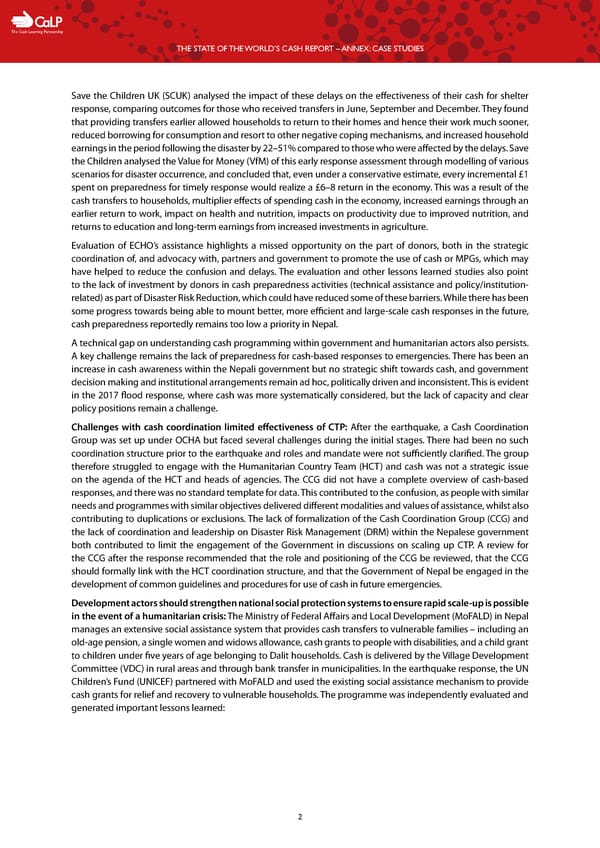C The Cash Learning Partnership THE STATE OF THE WORLD’S CASH REPORT – ANNEX: CASE STUDIES Save the Children UK (SCUK) analysed the impact of these delays on the effectiveness of their cash for shelter response, comparing outcomes for those who received transfers in June, September and December. They found that providing transfers earlier allowed households to return to their homes and hence their work much sooner, reduced borrowing for consumption and resort to other negative coping mechanisms, and increased household earnings in the period following the disaster by 22–51% compared to those who were affected by the delays. Save the Children analysed the Value for Money (VfM) of this early response assessment through modelling of various scenarios for disaster occurrence, and concluded that, even under a conservative estimate, every incremental £1 spent on preparedness for timely response would realize a £6–8 return in the economy. This was a result of the cash transfers to households, multiplier effects of spending cash in the economy, increased earnings through an earlier return to work, impact on health and nutrition, impacts on productivity due to improved nutrition, and returns to education and long-term earnings from increased investments in agriculture. Evaluation of ECHO’s assistance highlights a missed opportunity on the part of donors, both in the strategic coordination of, and advocacy with, partners and government to promote the use of cash or MPGs, which may have helped to reduce the confusion and delays. The evaluation and other lessons learned studies also point to the lack of investment by donors in cash preparedness activities (technical assistance and policy/institution- related) as part of Disaster Risk Reduction, which could have reduced some of these barriers. While there has been some progress towards being able to mount better, more efficient and large-scale cash responses in the future, cash preparedness reportedly remains too low a priority in Nepal. A technical gap on understanding cash programming within government and humanitarian actors also persists. A key challenge remains the lack of preparedness for cash-based responses to emergencies. There has been an increase in cash awareness within the Nepali government but no strategic shift towards cash, and government decision making and institutional arrangements remain ad hoc, politically driven and inconsistent. This is evident in the 2017 flood response, where cash was more systematically considered, but the lack of capacity and clear policy positions remain a challenge. Challenges with cash coordination limited effectiveness of CTP: After the earthquake, a Cash Coordination Group was set up under OCHA but faced several challenges during the initial stages. There had been no such coordination structure prior to the earthquake and roles and mandate were not sufficiently clarified. The group therefore struggled to engage with the Humanitarian Country Team (HCT) and cash was not a strategic issue on the agenda of the HCT and heads of agencies. The CCG did not have a complete overview of cash-based responses, and there was no standard template for data. This contributed to the confusion, as people with similar needs and programmes with similar objectives delivered different modalities and values of assistance, whilst also contributing to duplications or exclusions. The lack of formalization of the Cash Coordination Group (CCG) and the lack of coordination and leadership on Disaster Risk Management (DRM) within the Nepalese government both contributed to limit the engagement of the Government in discussions on scaling up CTP. A review for the CCG after the response recommended that the role and positioning of the CCG be reviewed, that the CCG should formally link with the HCT coordination structure, and that the Government of Nepal be engaged in the development of common guidelines and procedures for use of cash in future emergencies. Development actors should strengthen national social protection systems to ensure rapid scale-up is possible in the event of a humanitarian crisis: The Ministry of Federal Affairs and Local Development (MoFALD) in Nepal manages an extensive social assistance system that provides cash transfers to vulnerable families – including an old-age pension, a single women and widows allowance, cash grants to people with disabilities, and a child grant to children under five years of age belonging to Dalit households. Cash is delivered by the Village Development Committee (VDC) in rural areas and through bank transfer in municipalities. In the earthquake response, the UN Children’s Fund (UNICEF) partnered with MoFALD and used the existing social assistance mechanism to provide cash grants for relief and recovery to vulnerable households. The programme was independently evaluated and generated important lessons learned: 2
 The State of the World's Cash | Case Studies Page 3 Page 5
The State of the World's Cash | Case Studies Page 3 Page 5